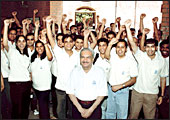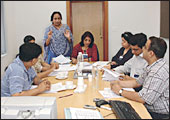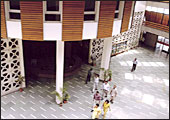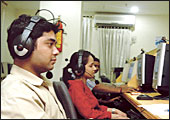 |
| Mint-fresh: IIM-A's Bakul Dholakia poses
with the maiden batch of executive MBA, called PGPX |
 |
| Learning @ISB: KPMG managers hone their
skills at ISB's Hyderabad-based campus |
Picture
this. You are on the operations side in your company. You have
five to seven years of work experience, a decent pay package,
supportive colleagues and a promising work environment. Yet you
haven't managed getting to that coveted general management position.
What comes in the way is the lack of that crucial MBA tag to your
resume. Most of your colleagues with MBAs have already passed
you by. You are in a fix as to what to do because you cannot leave
your job for two years to get back to a regular MBA programme,
primarily because of the opportunity cost involved. Besides, who's
going to pay the bills (the EMIs for your apartment and car) while
you are away in a B-school?
The top B-schools in the country probably
had managers like you in mind when they devised their executive
education programmes. The concept is, of course, not new, but
it is rapidly evolving. Says Prakash Apte, Director, Indian Institute
of Management Bangalore: "There has been no major change
in management education in the country, except for executive education.
There is a growing demand from practising managers for management
courses." In fact, among themselves, the top 10 B-schools
in the country offer as many as 20 such courses, not counting
those with duration less than six months. More than 3,000 executives
are enrolled in such courses. While some are fully or partly residential,
a fair number are weekend or distance learning courses (via VSAT).
Says Prof. B.B. Chakrabarti of IIM Calcutta, "If someone
has done line management throughout his career, he might find
it difficult to rise to the level of a General Manager. We can
at least provide the requisite knowledge and skills that would
help him reach there."
Chakrabarti says that the curriculum for
the one-year, full-time residential Post Graduate Programme for
Executives (PGPEX) at IIM-C is devised to help executives taking
general management positions in their respective organisations.
"To rise quickly up the ladder," reckons C.D. Bhattacharya,
Dean, Faculty of Management Studies (FMS), Delhi, "a person
needs to have strong conceptual, analytical and communication
skills." Bhattacharya claims that several middle-level executives
who have graduated from the three-year, part-time MBA programme
at FMS have quickly risen to senior management positions.
Look Before You Leap
But most such people have risen within their
own domains. Executive programmes are not passports to an entirely
new career. So if you are looking to shift, say from manufacturing
to hr, executive education may be of little help. "We advise
those looking for a change in career against pursuing such courses,"
explains a Delhi based B-school professor. "At best these
programmes are a value-addition to your experience within the
industry," he says. Moreover, executive programmes do not
offer any formal placement assistance. "Students do make
attempts to organise something on their own," says Professor
M.S. Narasimhan of IIM-B, where students of the eight-month Executive
General Management Programme (EGMP) are trying to tie up with
placement agencies for lateral moves. Out of the top 10 B-schools,
only IIM-A, C and I offer placement assistance. XLRI Jamshedpur,
however, plans to introduce a regular placement facility for two
of its executive education programmes, starting this batch.
But a promotion and a fatter pay packet are
not the only reasons why middle-level executives aspire for management
courses. IIM-B, for one, claims that its executive education programmes
are aimed at "broadening the outlook and strengthening the
skills of practising managers". This is exactly what Mukta
Arora achieved after going through EGMP at IIM-B. "I joined
the programme to develop my skills around strategic thinking and
also for networking around the industry," says Arora, Vice
President (Supply Chain Management), Eli Lilly. Arora, with 15
years of experience, now finds herself better equipped for her
career ahead. "The basic change is that one begins to appreciate
the cross-functionality within the organisation," she feels.
Adds Vasudev Chivukula, a 39-year-old executive with Larsen &
Toubro, currently pursuing a three-year, part-time MBA at XLRI:
"There is no scope any more for applying trial and error
methods at the workplace. Today, you need to be effective very
timely and in every circumstance."
 |
| Lure of IIFT: Globalisation has made
its courses popular |
 |
| Tech-savy: Executive education is now
delivered online |
Since the takeout from executive courses can
vary widely depending on the participant's own input in terms
of time and energy, the institutes tend to pick their participants
with some care. Typically, a minimum work experience of, say,
five years is expected. Another requirement is experience at a
supervisory or decision-making position. "Executive students
often have clearer goals in mind as compared to most freshmen,"
says L.D. Mago, a professor at the Delhi-based Indian Institute
of Foreign Trade (IIFT), which runs three different executive
programmes.
The core curriculum of most such programmes
is similar to that of a regular mba course. Where they differ
is in delivery. The teaching is mostly through case studies, which
require the students to do extensive reading and discussion to
come up with appropriate solutions. "The level at which we
pitch the course and content is very different. Here the things
are to be done in fast track," says IIM-C's Chakrabarti.
"We do not dwell too much on the elementary aspects of subjects
like organisational structures, as all students are working executives
and have a fair grasp of the practical aspects," adds Mago
of IIFT.
The programmes are, therefore, designed to
focus more on real-life business situations and the workplace.
Most schools (especially the IIMs) now follow the case study method
for executive courses and some even develop their own case studies
based on the most recent developments in industry. Some others
like FMS, however, still cover aspects theoretically. "We
are not as rigid as some of the IIMs when it comes to teaching
methodology," explains Bhattacharya of FMS. Almost all B-schools,
especially the autonomous ones, claim to modify and even overhaul
their course modules on a regular basis so as to remain relevant
to industry needs. But those like FMS that are a part of the university
system, find it harder to affect change quickly.
The B-schools claim that these courses are
as rigorous as the regular MBA programmes. In fact, some schools
also claim that their executive programmes (especially the ones
offered part time) are longer than regular MBA programmes so as
to keep the academic content as rigorous as that of the regular
courses. "Our Post Graduate Programme in Business Management
for Working Managers is as good as any MBA programme. It is a
part-time programme that is why it is three-year long," claims
Professor Sushil Kumar of IIM Lucknow. Some like Abhishek Kumar,
a Tata Steel executive pursuing a part-time MBA from XLRI, choose
to do a part-time course because they "want to have the best
of both the worlds". But there are others who candidly admit
that an executive programme can, in all fairness, never be as
competitive and rigorous as a regular MBA. "The number of
applicants for such courses is far fewer. Moreover, because most
such courses are non-residential with classes in the evening or
over the weekends, there is often minimal interaction between
the faculty and students and among the peer groups themselves,"
concedes a senior professor at one B-school. "Conducting
such courses often becomes a logistical nightmare."
| The ISB Effect |
| The Hyderabad-based
Indian School of Business has played a key role in popularising
executive education in the country. Although ISB doesn't call
it so, its flagship one-year MBA programme is actually a perfect
fit for managers who don't want to spend two years out of
employment for an MBA degree. Therefore, a large number of
the students who get into ISB have several years of work experience.
A minimum experience of two years is mandatory. The programme's
objective, says Deputy Dean, Ajit Rangnekar, "is to create
leaders for a fast-developing economy, which need a new kind
of leadership". An MBA at ISB, which looks for leadership
potential among its applicants apart from their GMAT scores,
doesn't come cheap: It costs a whopping Rs 14 lakh (not including
accommodation and food). That apart, the school runs several
short-term courses, often designed specifically for some companies. |
Remote Delivery
As a result, B-schools are experimenting
with various delivery methods. IIM-B and IIFT offer their programmes
over the weekend on campus and also to remote centres via live
webcast. On the other hand, IIM Indore, which offers an 18-month
long Executive Post Graduate Programme in Management, has its
course divided into six terms of three months each, and the participants
are supposed to stay on campus twice a term, for nine-10 days
each. This is where the employer's consent becomes important.
Professor Ashish Sadh from IIM-I says that employers are encouraging
this type of education. "Organisations provide abstract ideas,
which become inputs for such courses," contends R.K. Jadhav,
Director, Jamnalal Bajaj Institute of Management Studies (JBIMS),
Mumbai. To ensure that there is no objection from the employer
while the employee pursues the course, most schools seek organisational
sponsorship or a 'no objection certificate' from the employer.
Kamal Singal, who took the programme at IIM-I, says he went for
this even after putting in 10 years in industry and after having
already reached the senior management position. "The organisation
also supports this kind of learning as it is good to see people
growing," says Singal, Head (Operations) for denim garments,
Arvind Mills. Concurs Dipankar Dasgupta, Abhishek Kumar's line
manager at Tata Steel: "Such programmes help broaden the
canvas available to employees and develop skills they require
to take on greater responsibilities."
Executive education, however, does not come
cheap. There is a huge difference between fee structures of courses
offered by autonomous/private B-schools like the IIMs and XLRI
and those such as FMS and JBIMS that operate within the university
system. If you plan to pursue a year-long PGP for executives at
IIM-A, be ready to shell out Rs 10 lakh in fees. Similar, but
not identical, programs at IIM-B and IIM-I will set you back by
Rs 8 lakh and Rs. 4 lakh, respectively. On the other hand, a three-year,
part-time MBA from FMS and JBIMS will cost you a little over Rs
30,000 and Rs 51,000, respectively. This disparity may not remain
for long. If informed sources are to be believed, FMS may raise
its fee from the current Rs 10,000 to Rs 1 lakh per annum. But
if you can manage to convince your employer to foot your bill,
be prepared to stay on at the company, since that may be part
of the sponsorship contract.
Despite the high costs involved, there is
a growing number of takers for such courses. "Managers today
are beginning to recognise the need to beef up their resume, which
is why executive courses are gaining ground," reckons Prabir
Sengupta, Director, IIFT. Father N. Casimir Raj S.J., Director,
XLRI, agrees: "As long as corporations feel management graduates
contribute to their growth, such programmes will remain attractive."
And B-schools, which make a killing on executive education, are
only too happy to oblige.
|







